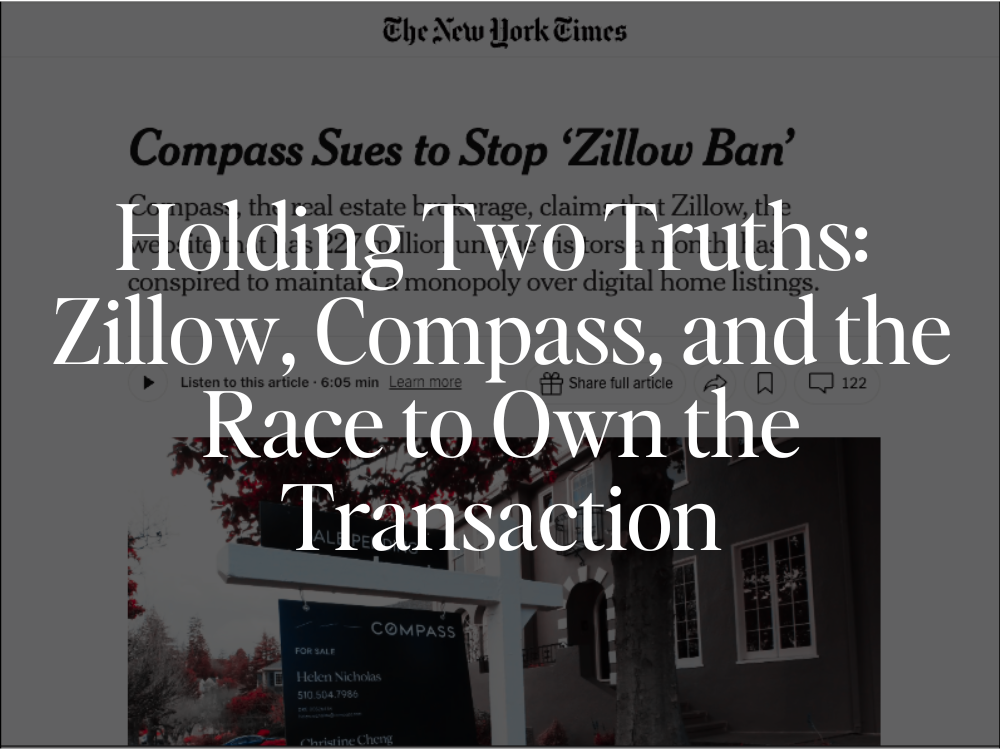“The test of a first-rate intelligence is the ability to hold two opposing ideas in mind at the same time and still retain the ability to function.”
— F. Scott Fitzgerald
I’ve thought of this quote often over the last several months, as bombastic headlines and mudslinging swirl around the real estate industry. As a marketer and business person, I fully understand the value of picking a fight and forcing sides. It can galvanize a community, a brand, and a business. It can help simplify complex concepts.
But when we reduce that complexity to simple metaphors and social media battles, we rob ourselves of the opportunity for a real, nuanced conversation. The truth is: all players in this industry are self-interested. That’s how capitalism works. And real estate—despite the personal significance of homeownership—is a business.
It’s about owning the end-to-end real estate transaction.
In this business, every major player has the same end goal:
To own the real estate transaction from end to end. Full stop.
It’s where the profit lives. It’s where long-term growth lives. It’s where investors want the story to go.
If you’ve ever run a brokerage, you understand this deeply. Margins are thin and getting thinner. Steve Murray has reported on these trends over the years and most recently shared that the industry’s average Gross Margin (what remains after paying agents) has declined to approximately 10%—a drop of more than 50% since 2012. That’s why brokerages have long looked to ancillary services to improve profitability. It’s why we’ve seen mergers and partnerships—like Rocket, Redfin, and Cooper—trying to gain a foothold along the transaction chain.
Everyone started by planting a flag somewhere along the transaction—top of funnel, middle, or close—and has been working to expand along the continuum ever since.
The common hurdle? MLS System.
What began in the late 1800s as a way for local agents to share property info turned into a fragmented network of 500+ MLSs, often slow to modernize and misaligned with how consumers behave in a digital world. The geographic sprawl, limited tech investment, and strong local self-interest made it virtually impossible to create the kind of seamless search experience people expected in every other part of their lives.
Enter Zillow.
If you’ve ever tried to build a national proptech platform, you know how difficult and expensive MLS integrations are. At a recent event, a speaker told aspiring PropTech founders to budget at least $1 million just to get access to MLS data. It’s one of the biggest reasons residential real estate continues to lag behind in tech.
Zillow saw the need. They took the pain. And they built the engine.
They weren’t just filling a void—they were building a moat. One that generated massive consumer preference, brand habit, and long-term defensibility.
Zillow planted its flag at the top of the funnel: search. And then, like any smart business, they expanded. Lead gen. Mortgage. Transaction management. Sound familiar?
Yes, some of Zillow’s monetization strategies have raised eyebrows. The Zestimate. The “Contact Agent” button. Both have been criticized for misleading consumers or undermining agents. But they were designing to what consumers wanted, even if those same consumers didn’t fully understand how the sausage gets made. (Not unlike what we saw in the early days of social media.)
You can argue about the methods. But it was the MLSs that made Zillow’s dominance possible by failing to meet modern consumer demand. And meanwhile, Zillow built a platform that gives agents mass exposure—something that costs money in many other countries.
Now, let’s turn to the brokerages.
There was a time when brokerages were good businesses. But as models evolved—RE/MAX shifted to 100% commissions, Keller Williams launched profit sharing, eXp went fully digital—their profits came under intense pressure. To compete, they had to offer more tools, higher splits, better support. The financial squeeze got real.
Each brokerage responded in its own way:
- eXp cut physical overhead and offered revenue sharing.
- Compass built proprietary tech to drive agent productivity.
- Anywhere and RE/MAX leaned into franchising and global growth.
- Local boutiques banked on white-glove service and loyalty.
And everyone started chasing mortgage attach rates while trying to stay on the right side of RESPA.
Just like Zillow, brokerages are for-profit businesses. They answer to owners and shareholders. They’re not villains—they’re operators trying to make the math work.
Compass, in particular, has been clear: it wants to own the full transaction. It started by acquiring top agents to gain inventory and market share. It invested heavily in its tech backbone. It built tools like “Coming Soon” and “Three-Phase Marketing Plan” to encourage listing with Compass before publicly hitting Zillow. Their strategy? Get more people to start the buyer journey with Compass instead. Plus, give their agents a differentiated offering.
Whether or not you agree with it, it’s a creative play in a stagnant industry.
But it doesn’t come without trade-offs.
To create search preference, Compass needed exclusive inventory—“you can’t see this anywhere else.” But exclusivity makes it harder for consumers to get a full picture of what’s on the market unless they jump between platforms / brokerages. Then, to make this strategy work, Compass needed agent buy-in. And to get that buy-in, they needed to frame Zillow as the problem.
Which brings us back to Fitzgerald.
You can believe that Compass is innovating and also believe that Zillow created real value for consumers. You can believe that both are trying to own the transaction and that both are, at times, making moves that raise tough questions. Neither is entirely right. Neither is entirely wrong. Both are operating with the same North Star: growth, scale, margin.
The question isn’t which side you’re on.
The question is: do you understand the game that’s being played?


